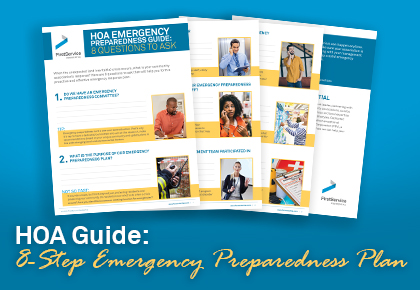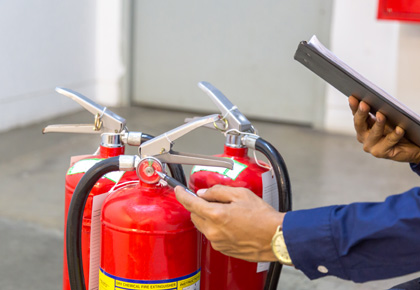Narrow Results
-
Policies for Hurricane Season: What Your Community Needs to Know
What hurricane policies should you have in place to make sure that all residents are on the same page and protected? -
Can Your HOA Handle a Crisis? 8-Step Emergency Preparedness Plan
Is your HOA ready for a crisis, or does your emergency plan need improvement? Download a complimentary guide, HOA Emergency Preparedness Guide: 8 Questions to Ask . -
5 Surprising Reasons to Raise Your HOA Assessments
If your main concern is to avoid increasing assessments, you may want to reconsider. As a board member, one of your primary fiduciary responsibilities is to protect property values, and assessments are an investment that helps do just that. -
Your HOA Board and Coronavirus: 5 Questions to Discuss
How should your HOA board handle a pandemic like COVID-19? Start by tackling these 5 questions -

Can Your HOA Handle a Crisis? 8-Step Emergency Preparedness Plan
Is your HOA ready for a crisis, or does your emergency plan need improvement? Download a complimentary guide, HOA Emergency Preparedness. -
Post-Crisis HOA Cash Management: 3 Tips for Your Association
How do you manage collections and HOA funds after a crisis? Get 3 tips to help you plan for the future -
-

Reserve Funds, Assessment, or Loan: 3 Ways to Pay for a Capital Improvement Fee
Great capital improvements lead to better property values. Read on to see the three ways to pay for them and the pros and cons for each. -
Seven High-Rise Insurance Tips for Associations and Unit Owners
Many people who live in cities like Phoenix and Scottsdale appreciate the rewards that come with living in a high-rise building. Some of the unique advantages include great amenities, security and even concierge services. High-rise buildings are also unique when it comes to insurance coverage. Besides the individual policies that unit owners need to have, the building and common areas must be covered as well. -
3 Strategies to Keep HOA Assessments Stable and Add Value
There are often valid reasons to raise assessments, but in some cases, you may want to take a different route. Here are three cost-saving strategies. -
Smart Financial Planning
Safeguarding a strata corporation’s operating and reserve funds is one of the main fiduciary duties of all board members, not just the treasurer. This means strata councils must protect the financial interests of the strata corporation and its members. -
Can Your HOA Handle a Crisis? 8-Step Emergency Preparedness Plan
Is your association really prepared for an emergency? Learn how to develop an HOA emergency preparedness plan in 8 steps. -
Your HOA Board and Coronavirus: 5 Questions to Discuss
How should your HOA board handle a pandemic like COVID-19? Start by tackling these 5 questions. -
How to prepare for an earthquake and its aftermath in California
An earthquake in California can strike at any time, and they are daily occurrences throughout the state with varying impact and magnitude, with approximately 10,000 taking place each year. -
Post-Crisis HOA Cash Management: 3 Tips for Your Association
How do manage collections and HOA funds after a crisis? Get 3 tips to help you plan for the future -
Preventing Cyber Attacks, Part 3: Your HOA’s 4-Step Digital Defense Plan
Without a doubt, digital technology has made our everyday tasks easier and more convenient than ever. Mobile phones and tablets allow you to pay monthly bills, upload family photos and store important documents in “the cloud” with just a few taps and swipes. Homeowners associations are taking advantage of this pervasive technology in droves, using property management software to expedite resident transactions, sign documents with electronic signatures, and perform tasks more efficiently. -
Reserve Funds, Assessment or Loan: 3 Ways to Pay for Capital Improvements
Strategic capital improvements lead to better property values. Read on to see the three ways to pay for them and their pros and cons. -

3 Strategies to Keep HOA Assessments Stable and Add Value
There are often good reasons to raise assessments, but in some cases, you may be able to take a different route. Here are three strategies to help save your HOA money and keep assessments stable. -
Active Shooter Training: What Should Your Community Do?
More than 1.4 million Americans have been killed by gunfire since 1968. Many of those shootings were accidental; some were suicides; some were at the hands of law enforcement officers in the line of duty. But many were not. Mass shootings, meaning that at least three people were killed by gunfire, have become an almost daily occurrence in the United States, with instances increasing each year since 2000, and many instances becoming more deadly. Thankfully, incidents of violence in community associations are rare, but unfortunately, they do occur. -
After the Storms: A Harvey and Irma Update from Our CEO
We have a very long road to recovery ahead for both Texas and Florida, for those of us affected by Hurricanes Harvey and Irma. In the aftermath of the storms, there are tangible examples of our industry leadership, and in particular, why our ability to immediately leverage the depth of resources we have at our disposal is such a powerful differentiator for us. Here are a few examples of how we leveraged our resources, organization-wide, to ensure seamless service delivery for our clients. -
How to prepare for an earthquake in your community association
As unpredictable as earthquakes can be, your community association should be prepared in case you ever feel the unmistakable rumble of a tremor. Here’s what you need to know. -
What to know about your HOA emergency preparedness plan
No board ever wants to find itself in the midst of an emergency, but they happen. Whether you face an outbreak of illness, an earthquake, a hurricane, a fire, the impact of any devastating event can be minimized by good emergency preparedness planning. -
Fallon Describes Emergency Storm Relief on Fox Business’ Cavuto
On October 28, the eve of Superstorm Sandy’s one-year anniversary, Fox Business News aired a powerful segment featuring Chuck Fallon, FirstService Residential CEO. -

5 tips for fire safety in a building or high rise
Living in a high-rise, condominium or co-op certainly has its perks. You get the convenient location, the dramatic views, attentive concierge services and a range of amenities. However, vertical living also means added challenges when it comes to fire safety. Fortunately, there are measures that both your association board and residents can take to improve safety.